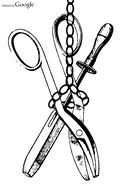
Metal Smelting & Archeometallurgy
Smelting is the reduction of metallic ores to produce metals (it is thus distinct from melting, which is the liquification of metal for purposes such as casting). I haven't done it yet, but like any number of home metal shop enthusiasts I know, I have dreams of making my own iron someday. Someday. But understanding the history and archaeology of metal production is an important part of understanding the use of metals in both casting and smithing. So it's useful to me to keep notes on the theoretical side of this as I dream of the practical (or impractical, really) aspects.

Metal Smithing
Primarily the blacksmithing and whitesmithing of Iron & Steel. (But note that whitesmithing merges quickly into Fitting and was the predecessor of Machining.
Possibly later the smithing of Copper/Bronze/Brass, Aluminum, Silver, Tin, (and More?)

Fitting & Mechanics
And General Bench-work. Often overlooked, this is the set of basic workshop skills upon which industrial civilization is based. It is based around the use of hand tools, primarily with metal and encompasses the fitting of parts to each other in non-interchangeable precision manufacturing.
[General literature.] [Layout.] Measurement, inspecting, and testing using hand tools. Mechanics. Files & Filing. Hand Scraping [Mechanical connections (riveting, threaded fastening).] Apprentice's Projects [links to Notebook in Machine Shop].

Machining
The use of machine tools for cutting and forming metals, wood, machinable plastics, and other materials: Cutting Tool Forming and Sharpening. Collets. Measuring, Inspecting, Testing (by machine). [Plain Turning.] [Ornamental turning.] [Straight-Line and Geometrical Engine Work.] Pantograph Engraving. The Metalworking Shaper. [Horizontal Milling.] [Milling: Horizontal; Vertical & Bridgeport; Non-Pantographic Die-Sinking.] Surface Grinding. [Sawing by Machine.]
Also, a survey of the machine tools at CircuitousRoot.

Sheet Metal (and Conduit) Work
I don't do much sheet metal work, so there isn't much here. This Notebook does include, however, a small (3-inch wide) sheet metal brake for thin metal, intended to be fabricated on a 3-D printer.
All portions of this document not noted otherwise are Copyright © 2006-2011, 2019, 2022 by David M. MacMillan.
Circuitous Root is a Registered Trademark of David M. MacMillan.
This work is licensed under the Creative Commons "Attribution - ShareAlike" license, version 4.0 International. See http://creativecommons.org/licenses/by-sa/4.0/ for its terms.
Presented originally by Circuitous Root®